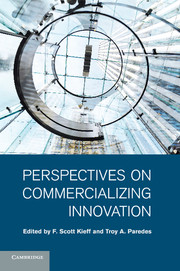Book contents
- Frontmatter
- Contents
- Contributors
- Dedication
- Acknowledgments
- Introduction
- Part I Perspectives on Theories of Intellectual Property
- Part II Perspectives on the Problems of Anticommons and Patent Thickets
- Part III Perspectives on Finance and Commercialization
- Part IV Perspectives on the University Innovation
- 13 University Software Ownership and Litigation
- 14 The Impact of the Bayh-Dole Act on Genetic Research and Development
- 15 Patents, Material Transfers, and Access to Research Inputs in Biomedical Research
- 16 Are Universities Patent Trolls?
- Part V Perspectives on International Considerations
- Index
- References
13 - University Software Ownership and Litigation
A First Examination
from Part IV - Perspectives on the University Innovation
Published online by Cambridge University Press: 05 December 2011
- Frontmatter
- Contents
- Contributors
- Dedication
- Acknowledgments
- Introduction
- Part I Perspectives on Theories of Intellectual Property
- Part II Perspectives on the Problems of Anticommons and Patent Thickets
- Part III Perspectives on Finance and Commercialization
- Part IV Perspectives on the University Innovation
- 13 University Software Ownership and Litigation
- 14 The Impact of the Bayh-Dole Act on Genetic Research and Development
- 15 Patents, Material Transfers, and Access to Research Inputs in Biomedical Research
- 16 Are Universities Patent Trolls?
- Part V Perspectives on International Considerations
- Index
- References
Summary
Software patents and university-owned patents represent two of the most controversial intellectual property developments of the past few decades. Various scholars have quarreled with the alleged vagueness and undue breadth of software patent claims. Some have also suggested that, given the poor quality of prior art documentation and patent examiner training in the area of software, many issued software patents are likely to be obvious. More generally, there is significant debate over the extent to which software patents are likely to foster (or hinder) innovation. Because software products are often “complex” and may infringe many patents, some incumbent providers of information technology (IT) products support the limiting of patentability. Perhaps most notably, the U.S. Court of Appeals for the Federal Circuit (arguably prompted by the recent questioning of patents on “abstract ideas” by several members of the Supreme Court) recently excluded processes from patentability (including software processes) that are not limited to a physical transformation or machine.
In contrast with software patents, university-owned patents have existed for more than a few decades. The number of university-held patents has increased substantially, however, since the 1980 passage of the Bayh-Dole Act. While the legal question was sometimes murky prior to 1980, Bayh-Dole made it unequivocally clear that universities can patent federally funded research.
- Type
- Chapter
- Information
- Perspectives on Commercializing Innovation , pp. 395 - 434Publisher: Cambridge University PressPrint publication year: 2011



